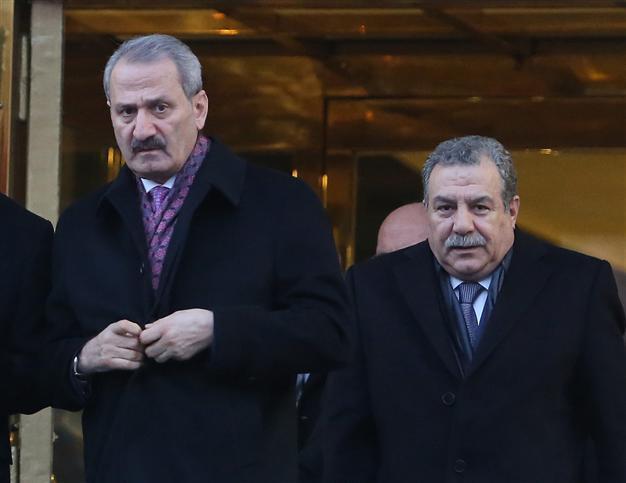Dec 17 graft probe into senior government figures officially dropped
ISTANBUL – Hürriyet Daily News

Former ministers Zafer Çağlayan and Muammer Güler, who were both embroiled in the original Dec 17 investigation. Hürriyet Photo
A landmark graft probe into senior government figures was officially dropped a day before its first anniversary when the Istanbul Chief Prosecutor’s Office rejected an objection to its decision to not pursue proceedings in the case.
As a result of the decision, prosecutors will not pursue corruption charges against 53 people, including Iranian-Azerbaijani businessman Reza Zarrab, Barış Güler – the son of former Interior Minister Muammer Güler – and Kaan Çağlayan, the son of former Economy Minister Zafer Çağlayan.
An Istanbul prosecutor from the anti-terror and organized crime unit of Istanbul Chief Prosecutor’s Office had decided Oct. 17 not to proceed against the 53 graft suspects that were detained on that day.
Prosecutor Ekrem Aydıner had pointed to a lack of grounds for legal action against the suspects. According to the semi-official Anadolu Agency, Aydıner found “problems with the evidence,” “no proof of criminal elements,” or any such other conspiracy.
In the investigation that was launched on Dec. 17, 2013, and targeted the government’s senior members, Zarrab was accused of paying bribes to senior government figures in a scheme that allegedly involved Barış Güler and Kaan Çağlayan. Süleyman Arslan, the ex-manager of the state-run Halbank, who was another suspect in the investigation, faced accusations of illegal transferring gold to Iran in exchange for money via Halkbank in partnership with a crime ring allegedly formed by Zarrab.
During the past year, the regulation in the working of the Supreme Council of Judges and Prosecutors (HSYK) was amended and the new regulation was published in the Official Gazette on Dec. 12. The amendments dramatically increased the power of the justice minister over the institution by giving the authority to preside over the HSYK and set the agenda, date and location of its annual General Assembly, and also approving all the nominated judges and prosecutors for the election of the Supreme Court of Appeals and the Council of State members.
The government blamed the “parallel state,” which the government has been using to refer to the sympathizers of the Fethullah Gülen movement, of launching the probe, and pledged to struggle and remove Gülen sympathizers from the police and judiciary. On Dec. 14, judicial authorities launched a new wave of detentions against journalists and others with ties to the movement, drawing international condemnation.
Meanwhile, within the first year of the graft probe and in an effort to cleanse the “parallel state” from the police department, many changes in Turkey’s police structure were made. While a total of 3,500 police are being subjected to judicial and administrative investigations in 65 provinces, around 80,000 police out of 250,000 in total have been relocated. Some 460 police, mainly from the smuggling and organized crimes, counter-terrorism and intelligence departments, were suspended from duty. While 185 police were discharged from their duties, investigations into 538 police to dismiss them from their profession are continuing.
The only current inquiry into the alleged graft is a parliamentary commission that was established to probe the four former ministers on May 5. Former ministers Erdoğan Bayraktar, Egemen Bağış, Güler and Zafer Çağlayan resigned from the Cabinet after the graft operation highlighted their relations with Zarrab, who allegedly paid them a number of bribes over several years.
Turkey’s media organizations were banned from reporting on the parliamentary commission in a Nov. 25 ruling, but the judge had later said the ban only applied to publishing all speeches in the commission “quote by quote,” which is also banned by parliamentary regulations. The judge said they had not banned “commenting” on the commission and its works.
